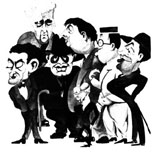
Why Are People Atheists?
FREUDIAN IRONIES
Only as it starts to fade can we see how strange the modern world has been. It is natural that some distance is needed for the characteristics of the “Modern” to become obvious, and nothing has been more typical, especially of public life, than the presumption of atheism. God has been banished from public discourse so thoroughly that in today’s high schools we teach about condoms and masturbation but are legally prohibited from making reference to the Deity.
In the academic world, serious reference to God in scholarly writing — not to mention the use of concepts like “providence” — is altogether taboo. To refer to God in any serious way would bring the legitimacy of one’s scholarship into question. But even in intellectual and academic circles, atheism did not become respectable until about 1870, and it continued to be restricted to small numbers of intellectuals into the 20th century. Not until the past half-century has it become a predominant assumption in public life.
In general, historians agree that atheism is a recent and distinctively Western phenomenon and that no other culture has manifested such a widespread public rejection of the divine. In view of the suddenness of the public shift from accepted belief to accepted unbelief, in view of its rarity in the historical record of other cultures, and in view of the continued high prevalence of private belief in God, atheism needs to be examined — indeed, explained.
The importance of atheism is, I trust, obvious, since it constitutes a major determinant of a person’s worldview. For example, if one believes in a personal God, life has obvious meaning, and one generally takes seriously the issues of moral and social responsibility. As Voltaire is reported to have said, “Don’t tell the servants there is no God, or they will steal the silver.” This view was later shared by Sigmund Freud, who believed that religion was necessary to keep the masses from acting on their sexual and aggressive impulses.
You May Also Enjoy
As we reached the top of the mountain, she flailed her ski poles in the air and yelled angrily, “There is no God! There is no Heaven! There is no Hell!”
Michael Harrington was an eloquent, attractive leader and lucid thinker. Even those who disagreed with him found it almost impossible not to love him.
Vox Day uses logic and facts (not theology) to refute the "unholy trinity" of Richard Dawkins, Sam Harris, and Christopher Hitchens.

